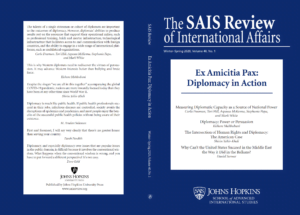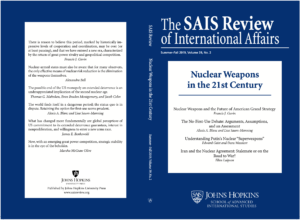


Bias and the Perceived China Threat
The Hacker and the State by Ben Buchanan
The Future of British Foreign Policy: Security and Diplomacy in a World After Brexit

The Governance Competition in the Americas: “Criminal Charity” During COVID-19 Will Have Decade-long Consequences
Latin America’s criminal groups have leveraged the coronavirus pandemic to win the goodwill and support of local populations by delivering humanitarian assistance and co-opting public service provision in communities underserved by state institutions. Such levels of “criminal charity” could complicate the future efforts of Latin America’s weakest states to dismantle and defeat organized crime groups, whose power has grown in recent years.

A Rendezvous with Destiny for Two Unsinkable Aircraft Carriers
Since the Trump administration designated China a “strategic competitor,” Sri Lanka and Taiwan have increasingly become plausible geopolitical flashpoints in the Pacific and Indian Oceans. How could Taiwan and Sri Lanka dictate the post-coronavirus endgame for China and the United States?

Toolkit for a Successful Movement: Digital Tools in Taiwan’s Sunflower Movement
In 2014, hundreds of thousands took to the streets of Taipei to protest the Cross-Strait Services Agreement—a free trade agreement between Taiwan and Beijing—believing it would give the Chinese Communist Party (CCP) too much political and economic control over the island. The protesters wielded social media and the internet to communicate, inform and mobilize. These tools did not work in a vacuum, however, and understanding their interactions with conventional media and offline associations becomes crucial. This paper demonstrates how, through one-way and interactive communications, the participants of the Sunflower Movement used digital tools to realize their demands.

SAIS Review’s Newest Issue ‘Nuclear Weapons in the 21st Century’ Available For Free Online
Volume 39, Issue 2 of the SAIS Review of International Affairs seeks to address the topic of nuclear weapons and their role in the 21st century. To that end, the featured essays spotlight some of the most pressing issues affecting nuclear weapons and shaping their future impact on strategy and the world more generally.

The African Union’s Institutional Approach to Transnational Terrorism
This paper examines the African Union's (AU) institutional approach to transnational terrorism. Specifically, its approaches in combating Al-Qaeda in the Islamic Maghreb (AQIM), Boko Haram, and al-Shabaab.

The SAIS Review Interview with His Excellency Dr. Thani bin Ahmed Al Zeyoudi
His Excellency Dr. Thani bin Ahmed Al Zeyoudi is the Minister of Climate Change and Environment for the United Arab Emirates

The RCEP minus India: Reasons and Implications
The RCEP was to be a potent vehicle to support the spread of global production networks and reduce the inefficiencies of the multiple prior Asian trade agreements. Yet India still pulled out. Why?

Indonesia’s Global Maritime Fulcrum: Confronting Maritime Irregular Warfare’s Twin Threats in the South China Sea and Maritime Southeast Asia
This paper examines Indonesia’s Global Maritime Fulcrum (GMF) initiative, and its present and future importance, primarily in combating the threat of maritime irregular warfare (MIW) in Southeast Asia. Specifically, it references the rise of grey-zone operations in the South China Sea, particularly by China.
